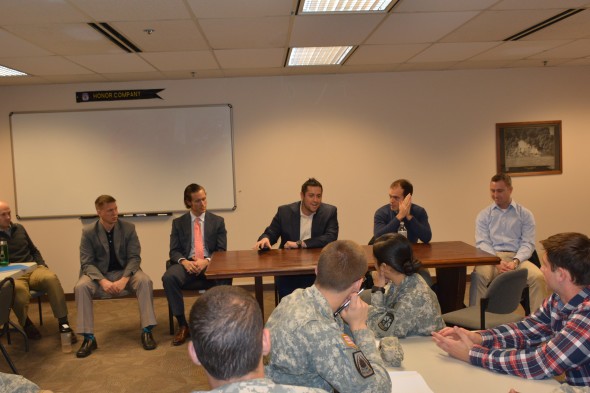In the full-time MBA program at Olin, it’s easy to be intimidated by your peers. Students come from a wide array of backgrounds and experiences, and there’s not a single person here who didn’t excel in whatever they were doing prior to school. Everyone is remarkably humble about their achievements, so often it takes some time before you’ll learn exactly how accomplished your classmates are.
Such was the case when I attended a panel set up by one of my core team members, Jon Slack (MBA ’17), who is also a ten year veteran of the Army. Jon and six other WashU MBA and JD candidates arranged to sit down with about 20 cadets from the local Army ROTC Gateway Battalion; a good chunk of these college juniors and seniors from nine schools in the St. Louis area had just received their orders for where they’d be stationed next year, and in what branch of the Army, and my veteran and active-duty classmates were on hand to pass on advice about what it’s like to be an officer in the Army at a young age, to share stories of their own experiences, and to speak about success after leaving the Army.

Veteran and Active Duty members of the Olin Business School and the Washington University School of Law share their experiences as young officers with junior and senior college students from the 9 member schools of the Gateway ROTC Battalion.
The event kicked off with one panelist sharing how he became immediately responsible for a unit of over forty men, and as more of my MBA classmates shared their stories, I was continually struck by how much responsibility each was given at a young age, and how much freedom they were given in how they went about fulfilling their duties. Although the stories were very different, as the panelists came from varied roles and divisions, there was much similarity in the approaches each took to tackling the challenges of being a new leader.
Danny Henry (MBA ‘17) advised cadets to “be quiet, listen, ask questions, and start to identify who has strengths, what they are, and how to leverage them.” All the panelists urged cadets to have respect for the experience of their NCOs, and to learn from them as much as possible.
David Marold (JD ‘16) framed it as a people business: “if you invest in building relationships, your authority is already there and built into that.”
Charlie Hon, (MBA ’16), shared the benefits of empowering Soldiers to take ownership of their projects, and of recognizing soldiers for their successes, no matter how small.
Dan Vitale (MBA ‘17) reminded cadets that “you’re young, but you know what right looks like,” and encouraged them to “ask dumb questions, because everyone assumes you know nothing anyway, but all that changes pretty quick. By the time you’re a first lieutenant, everyone will think you know everything.”
James Jacobs (MBA ‘17) extolled the virtues of being in shape, explaining how an easy way to immediately command respect from subordinates was to be able to outrun them in PT. He also encouraged cadets to learn to prioritize, “you’ll never get everything done, so figure out what has to be done, what should be done, and what would be nice to be done. And never try to cover up ‘has to be done’ with ‘nice to be done,’ it never works!”
Nearly every single piece of advice was equally applicable to the business world; near the end, I found myself scrawling down notes not for this blog piece, but for my own edification.
The anecdotes my MBA classmates relayed were often ones where they’d made mistakes, or learned lessons the hard way. Their stories and advice illuminated a particularly salient point made by Tony Nuber (MBA ’17): “leadership is a process, not a state of being,” and each cadet had the ability to be a good leader if they brought confidence, determination, and empathy to their role.
It was exciting to see the incredibly accomplished members of the MBA and JD classes interacting with the equally talented cadets of the Gateway Battalion, and to watch one generation of leaders give back to the next.
 Holekamp was honored that one of his former MBA students, Ben Burke, now Director of Entrepreneurship at Arch Grants, nominated him for the recognition. Burke tells SBM that he was inspired by Holekamp to return to WashU to teach a social entrepreneurship class where he invites his former mentor and professor as a “guest speaker” in his class.
Holekamp was honored that one of his former MBA students, Ben Burke, now Director of Entrepreneurship at Arch Grants, nominated him for the recognition. Burke tells SBM that he was inspired by Holekamp to return to WashU to teach a social entrepreneurship class where he invites his former mentor and professor as a “guest speaker” in his class.



 Kathy Osborn, Executive Director of the RBC, advised the audience to “find a company with a mission you can get behind.”
Kathy Osborn, Executive Director of the RBC, advised the audience to “find a company with a mission you can get behind.”


